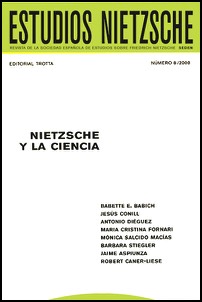Nietzsche in Imre Kertész’s Texts, or How to make One’s Way in a Contingent World
DOI:
https://doi.org/10.24310/EstudiosNIETen.vi8.10285Keywords:
language, art, fate, deathAbstract
By taking into account Nietzsche’s main concerns we can understand much better the works by Imre Kertész. In this paper I search for agreements between the Hungarian writer and the German philosopher relative to 1) the rhetorical conception of language, 2) the view of art as a vital function, and 3) the conception of temporality, and the forging of fate as fulfillment of the individual existence.
Downloads
Metrics
References
Aspiunza, J., «Conversación con Kertész», entrevista realizada y traducida por J. Aspiunza, Archipiélago 82 (2008).
Barrios Casares, M., Narrar el abismo. Ensayos sobre Nietzsche, Hölderlin y la disolución del clasicismo, Valencia: Pre-Textos, 2001.
Földényi, L., «Der Identitätslose und sein Ich. Zehn Begriffe für ein Kertész?Wörterbuch»: Du 757 (2005).
Kertész, I., «¡Eureka!», en La lengua exiliada. Artículos y discursos, trad. de A. Kovacsics, Madrid: Taurus, 2007.
Kertész, I., Diario de la galera, trad. de A. Kovacsics, Barcelona: Acantilado, 2004.
Kertész, I., Dossier K., trad. de A. Kovacsics, Barcelona: Acantilado, 2007.
Kertész, I., Fiasco, trad. de A. Kovacsics, Barcelona: Acantilado, 2003.
Kertész, I., Kaddish por el hijo no nacido, trad. de A. Kovacsics, Barcelona: Acantilado, 2001.
Kertész, I., Sin destino, trad. de J. Xantus, Barcelona: Acantilado, 2001.
Kertész, I., Un instante de silencio en el paredón. El holocausto como cultura, trad. de A. Kovacsics, Barcelona: Herder, 2 2002.
Kisiel, T., The Genesis of Heidegger’s Being & Time, Los Angeles: University of California Press, 1993.
Kovacsics, A., «Kertész y la decisión por el arte»: Archipiélago 82 (2008), 35-41.
Kundera, M., El arte de la novela, trad. de F. de Valenzuela y M. V. Villaverde, Barcelona: Tusquets, 2000.
Mann, Th., «Sangre de Welsungos», en La voluntad de ser feliz y otros relatos, trad. De R. Sala, Barcelona: Alba, 2001.
Nietzsche, F., Ecce homo, ed. A. Sánchez Pascual, Madrid, Alianza, 1978.
Nietzsche, El nacimiento de la tragedia, trad. de A. Sánchez Pascual, Madrid: Alianza, 1980.
Nietzsche, F., La genealogía de la moral, ed. A. Sánchez Pascual, Madrid: Alianza,1978.
Nietzsche, F., Más allá del bien y del mal, trad. de A. Sánchez Pascual, Madrid: Alianza, 1982.
Nietzsche, F., Sämtliche Werke. Kritische Studienausgabe, ed. G. Colli y M.Montinari, XII vol., Berlin-New York / München: W. de Gruytrer, 1980.
Nietzsche, F., Sämtliche Werke. Kritische Studienausgabe, ed. G. Colli y M.Montinari, XIII vol., Berlin-New York / München: W. de Gruytrer, 1980.
Nietzsche, F., Sobre verdad y mentira en sentido extramoral, trad. de L. M. Valdés, Madrid: Tecnos, 2007.
Downloads
Published
How to Cite
Issue
Section
License
As of issue 21 (2021) this journal is published only in open access (diamond route).
From that number 21, like the previous numbers published in NIETZSCHE STUDIES, they are subject to the Creative Commons Acknowledgment-NoComercia-ShareIgual 4.0 license, the full text of which can be consulted at <http://creativecommons.org/licenses/by-nc-sa/4.0 >
It is the responsibility of the authors to obtain the necessary permissions of the images that are subject to copyright.
This work is licensed under a Creative Commons Attribution-NonCommercial-ShareAlike 4.0 International License.
Copyright generates two different rights: moral rights and patrimonial rights that EJFB recognizes and respects. Moral rights are those relating to the recognition of the authorship. They are rights of a personal nature that are perpetual, inalienable, unseizable and imprescriptible as consequence of the indivisible union of the author and his/her work.
Patrimonial rights are those that can be derived from the reproduction, distribution, adaptation or communication of the work, among others.







11.png)
